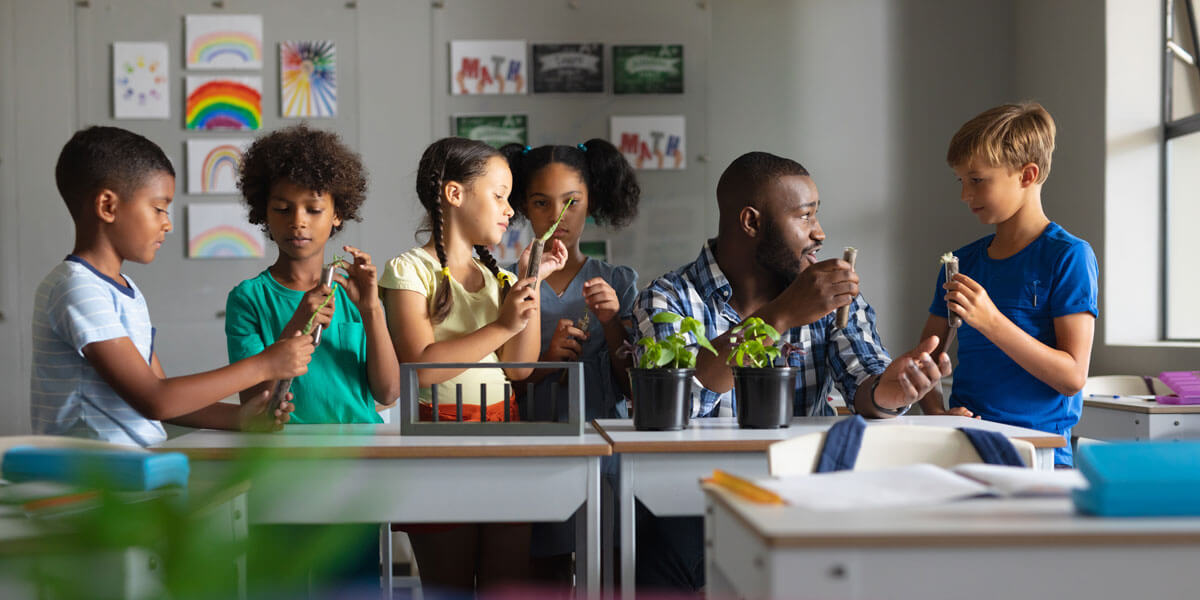The Importance of Focusing on Science in the Early Years

It would be easy to find a one-size fits all science program for grades K-12. Simply purchase, train teachers, and go. However, the easy option isn’t always best for your students. Every grade level has specific developmental needs that affect not only the content, but also the strategies necessary for engagement. That’s why a science program geared directly for the distinct needs of kindergarten, 1st grade, and 2nd grade students AND teachers makes sense. As Benjamin Franklin once said, “An investment in knowledge pays the best interest.”
Think back to the last time you visited a kindergarten-2nd grade classroom where students were actively involved. What did you see? What did you hear? Were the students sitting on the floor listening to a page-turning story? Were they seated at desks or tables engrossed in hands-on activities or moving around in centers with their peers? Children want to be actively engaged because young students are born investigators.
Why not take advantage of this natural curiosity and provide teachers with a science program that gives young students educational experiences that cater to their developmental needs? ExploreLearning Science4Us provides this while building a strong foundation required to be successful in the intermediate and upper grades. “Research has demonstrated that when young children enter school, they already have substantial knowledge of the natural world, can think both concretely and abstractly, use a range of scientific reasoning processes, and are eager, curious and ready to learn. Strengthening these innate abilities can begin in prekindergarten and primary grades and does not need to be reserved for older students,” according to NCSL (National Conference of State Legislatures).

Key Reasons for Making Science a Priority in Primary Grades
- Early learners are naturals with exploration and questioning. Just think about the number of times you’ve heard a young student ask this question: “Why?” It may be one of the shortest questions, but it speaks volumes to that innate curiosity. Children explore their environments and bring meaning to the world around them from infancy. We should lean into that sense of wonder in the early years of schooling through developmentally appropriate ways. Programs that help younger students grow as engaged participants in their own learning are valuable to their overall education.
- Early learners love to learn through play. Science for kindergarten, 1st grade, and 2nd grade is all about exposing students to foundational science skills, which involve inspecting objects, using magnets, drawing pictures, observing outcomes, and using manipulatives. To students, these are all forms of play. Engaging your students to these concepts today could lead to lifelong interests in science and technology-focused futures!
- Time is precious during the school day. Teachers want access to programs with multiple disciplinary activities that involve literacy, mathematics, and technology. That's why Science4Us infuses literacy and math throughout the program. Flexible delivery is key when working with early learners. Science lends itself to conversations and the sharing of tools and ideas, too. Young learners can build these essential social skills while having fun with science.
- Support is critical for educators, especially those with multiple subject areas. Teachers need a science program that provides ways to infuse science throughout their lessons and the pedagogy to feel comfortable and confident with the content. Teachers want seamless ways to bring cross-curricular lessons to their classrooms along with helpful, relevant professional development for successful implementation. It’s all here!
Science4Us Delivers!
Science4Us is the answer. Finally, a digitally delivered, standards-based science curriculum that allows kindergarten, 1st grade, and 2nd grade students the opportunities to build critical foundational science skills.
- Through the 5E Model, teachers are provided the best strategies to deliver a solid science lesson to their K-2nd grade students.
- Real-time science experiments, hands-on and digital activities, fast feedback, and game-based play encourages early learners to excel in science and fosters future STEM careers!
If you’re interested in learning more about our McREL study or are ready to engage your youngest learners in the foundations of science, email us.

What about the next steps for grades 3-12? Take a look at Gizmos for students to continue their educational journeys with scientific exploration.